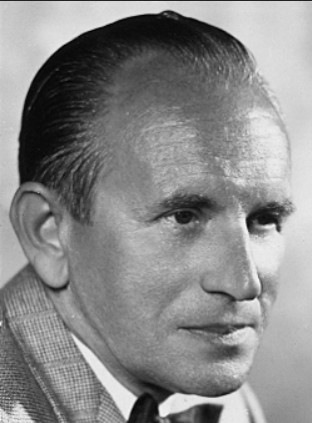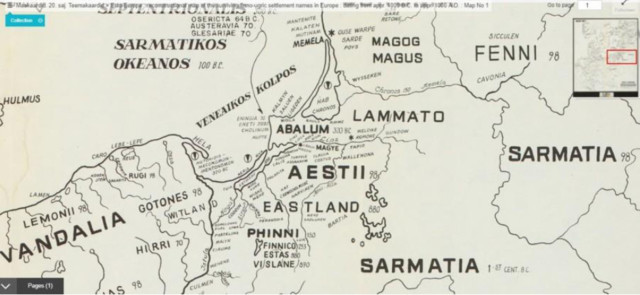Viron pakolaishallituksen opetusminiteriä 1971 - 1984 Edgar Valter Saksia, 1910 - 1984, pidetään "fantasiatieteilijänä". Siinä suhteessa hän ei kielitieteilijöiden ole poikkeus vaan enemmistöä... Joten katsotaan, mitä hän on kehitellyt...
https://en.wikipedia.org/wiki/Edgar_V._Saks

Edgar Valter Saks (January 25, 1910 Tartu – April 11, 1984, Montreal) was an Estonian amateur historian and author. He was the Estonian exile government's minister of education in exile from 1971 until his death.
His book The Estonian Vikings: a Treatise on Finno-Ugric Viking Activities describes the ancient history of Estonians and other Finnic peoples living on the shores of the Baltic Sea. His etymological works provide information about hypothetical extensive prehistoric Estonian settlement in Northern Europe. In Esto-Europa, Saks finds Baltic-Finnic influences in several regions of Europe. Constructing Estonian etymologies for many toponyms (incl. Warszawa and Sumer), Saks reasoned there must have been extensive prehistoric Finnic influence not only in Europe, but also in neighbouring regions. His works, often based on outdated or incorrect sources, have been characterised as pseudohistory. Linguist Urmas Sutrop has referred to him as "fantasiser and author of pseudoscientific history books".[1]
" Dear readers and researchers!
This .pdf scan combines two monographs by Edgar Valter Saks:
· AESTII. An Analysis of an Ancient European Civilization, 1960.
· ESTO-EUROPA: A Treatise on the Finno-Ugric Primary Civilization in Europe, 1966.
The maps attached to the ESTO-EUROPA, are available in high resolution, at the following links:
https://www.digar.ee/viewer/en/nlib-digar:352121/307333/page/1
https://www.digar.ee/viewer/et/nlib-digar:352123/307335/page/1

The third monograph, THE ESTONIAN VIKINGS, by Edgar V. Saks, 1981 – was scanned, converted into text format, and is available for downloading per the following link:
https://cloud.mail.ru/public/2sYY/2K2D7ZAEG
Also of wide interest is the monograph THE FINNO-EGYPTIAN CULTURAL ORIGINS OF THE OLD WORLD, by Sigurd Wettenhovi-Aspa, 1936 (346 MB): https://cloud.mail.ru/public/FPLa/n6nkSZWH2
Scans might be reworked, and updated links posted in the links section of the non-for-profit research
project The New Etymology: https://new-etymology.livejournal.com/
About the author.
The works presented to your attention were written by Edgar Walter Saks (1910 - 1984), a historian and the Minister of Education of the Estonian government in exile (1971 - 1984).
The author is often ‘tagged’ with labels, which the scholars attach to any researcher whose studies do not fit into the mainstream versions of history, agreed and written into school and university textbooks and encyclopedias. It is still tacitly forbidden to quote Edgar Saks in papers defended at the University of Tartu. Any references to Saks in the so called ‘free’ wikipedia are instantly removed by the ‘guardians’ hired to do so.
Nevertheless, Saks laid out a very important beginning in his works, which, we hope, shall sooner or
later become accepted in the scholastic circles. It is hard to ignore the obvious for a long time.
In the early 2000s, Saks' initiative was, in particular, picked up by Andres Pääbo, another Estonian
researcher living in Canada:
‘The old linguistic theory on the origins of Finno-Ugric languages, in describing their origins in a
tight location near the Ural mountains, has done the world of scholarship a great disservice. For
over a century scholars have completely ignored the Finno-Ugric languages in investigations of
prehistoric Europe simply because they have been told they were not there, but in the east.’
http://www.paabo.ca/uirala/FinnoUgricbkgd.html
Correction of mistakes of the German ‘comparativists’ is still outstanding and awaits the free-minded
scholars.
A Backlog for the Future.
Edgar Saks did not consider the Baltic toponyms in connection with the same toponyms to the East and South – perhaps, considering this field as already studied to a certain extent – after all, scientists do not deny that a significant part of toponyms in Russia are of Finno-Ugric origin.
At the same time, unfortunately, Edgar Saks (and still today the Institute of the Estonian Language
http://portaal.eki.ee/ ) do not consider the Estonian words in a broad relationship with words in Slavic
and Turkic languages (as if their speakers did not communicate between each other and to the Finno-Ugric nations, and lived each on a different planet).
This so far remains outside of the scope of research in the Universities. The history, including the history of languages, is currently still studied based exclusively on the written documents, ignoring the verbal evidence transmitted via folk epics over millennia, and disregarding the clearly visible evidence from comparisons to the very ancient archaic languages that have miraculously survived and acquired or restored a writing system only recently (in particular, the Finnic languages).
If the research scope were expanded, massive convergences come to surface, which allow to speak of a much greater linguistic unity in the not so distant past.
Discussions of Edgar Saks research and related works are currently conducted in the following
Facebook research groups:
• Finno-Ugric Heritage, Culture, History and Languages:
https://www.facebook.com/groups/1587573651536798
• The forgotten languages of the Old World:
https://www.facebook.com/groups/348091065579322/
We wish you all a pleasant and useful reading, and fruitful further studies!
Kalju Patustaja
Olga Lopakova
Kommentit